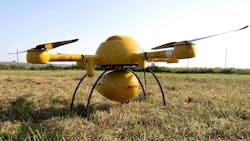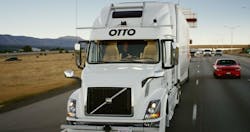Heavier use of robotics by transportation expected soon
In a recent technology survey of 455 U.S.-based companies across nine different industries by consulting firm ABI Research found that 30% of the transportation-focused respondents plan to introduce robotics into their business operations within the next year, while another 22% are actively “assessing” the use of technology.
"Transportation providers may view intelligent transportation technologies as solutions to evolve their existing transportation operations versus opportunities for developing new revenue streams & business models," noted Susan Beardslee, ABI’s senior analyst, in a statement.
"These players also show concern for legacy systems integration and comprehension of the complexity/fragmentation of their supply chain," she added.
Survey respondents find that intelligent transportation technology benefits are frequently linked to promoting workforce collaboration, centralized information technology (IT) and operations frameworks, as well as workforce mobility.
Yet ABI also noted that “primary barriers” to adopting such systems include data security and privacy concerns, alignment with existing legacy framework, and associated costs of technology adoption.
Respondents also expect limited impact of delivery drones over the next two years, while 40% do not see a role for this in their businesses within that timeframe.
Other findings concerning negative attitudes toward, and some perceived benefits of, key technologies include:
- Autonomous Vehicles: 44% of respondents are not familiar with autonomous vehicle technology for transport. Barriers including awareness will hold back adoption, at least in the near term.
- Operational Data Management: There is rising “disconnect” as respondents do not view consolidation alongside a reluctance to share data. Only 2% of respondents highly rank sharing operational data with peers and only 14% with key partners.
- Freight as a Service: 34% of respondents favor “Freight as a Service” for its ability and flexibility to choose loads and routes dynamically, but only 2% of respondents highly anticipate that it will grow their customer bases.
- V2X: ETE cargo tracking (38%) and vehicle monitoring (36%) saw the strongest results corresponding with industry growth.
- Artificial Intelligence: Only 4% of respondents rank navigation and guidance applications as a priority. AI remains a nascent technology, but it is critical to the adoption of autonomous vehicles.
"The results deliver validation that notable challenges remain to digitize, automate, and transform the transportation industry, especially with the very long tail of owner-operators and small fleets," ABI’s Beardslee pointed out.
"Support of emerging technologies draws mixed reactions, with ‘over the air’ [software updates] building awareness,” she emphasized. “But respondents still see other compelling technologies, such as gateways, as nascent to the transportation industry. We expect to see this increase soon to effectively link vehicles and assets to operations."

